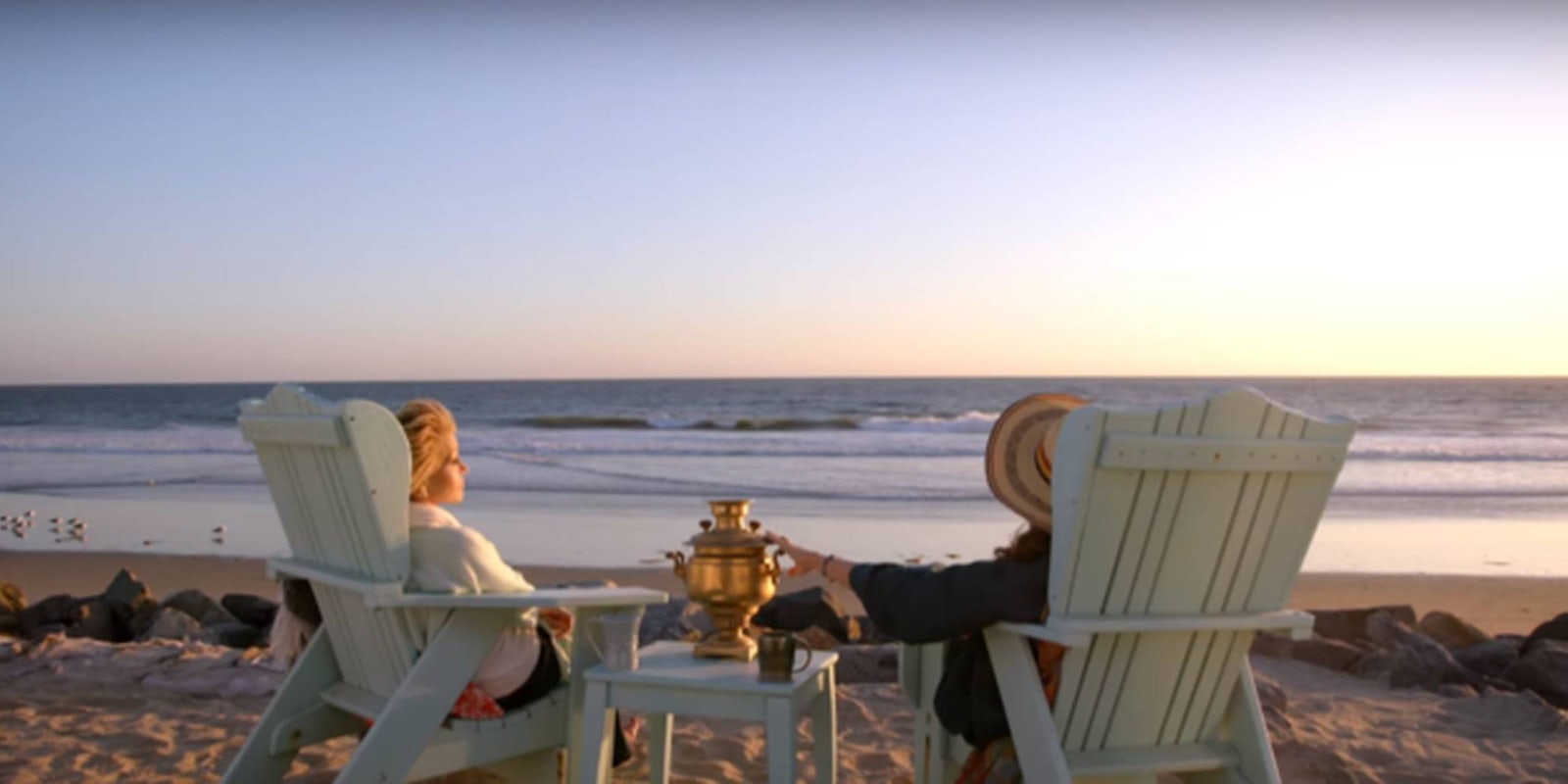Love isn’t always about romance. Sometimes it’s a purely platonic matter. Often it has to be kept secret for many years.
This much became clear in the first season of Frankie and Grace, the Netflix comedy written by Marta Kauffman and Howard J. Morris, and starring the indelible Lily Tomlin, Jane Fonda, Martin Sheen, and Sam Waterston.
Season 1 of Grace and Frankie followed two women, Grace (Fonda) and Frankie (Tomlin), longtime friends whose marriages have ended because their husbands announced that they’ve not only been working together but sleeping together for the past 20 years. Suddenly the two single, well-to-do women need each other. They form a funny pair—Grace is a control freak while Frankie is a chilled-out artist/hippie (she refuses to wash her car because of the drought, for example) into jokes, smoking weed, art, and, well, chill (which leads us to believe she could be great at Tinder, where apparently there are plenty of men her age).
There are some strong moments in season 1 that really gave us the feels, like when Grace and Frankie tried to buy cigarettes at a health food store in West Los Angeles and realized that they’re pretty much invisible to men now. It’s a sad reminder of the reality of what it’s like to grow older as a woman in America.
The show is centered around two women who realize that they’re stuck together—for better or worse. Mostly they have accepted that they need each others’ love and support. In season 1, they both have a few forays into the world of social media and Internet dating, as pretty much everyone in L.A. does. Since season 1 was such a romp through the initial plot points and character development, we were pumped to see where things would go in season 2.
The strange thing about Frankie and Grace, however, is that it really doesn’t seem like a Netflix show.
It is not binge-worthy. I tried to watch season 2 like I did Mad Men, Orange Is the New Black, or even the uninteresting show Love, but it didn’t work. Nothing edges the plot forward at the end of each episode; nothing leaves the viewer on the edge of a cliff, wanting more, more! Instead each episode ends like a weekly network sitcom of days past, or like an Amazon Prime TV show you’ve never heard of.
Truly, female best friendship isn’t just a thing of Sex and the City.
That doesn’t mean this show can’t work, however. Season 2 starts with a conflict that seems like it could ruin Saul and Richard’s freshly minted partnership. The relationships shift a bit, in that Frankie actually helps Saul get back into reality about the mess he’s made, and Grace rushes to Robert’s side during a medical emergency. No one feels great about these sort of enmeshments, however, and season 2 sees both Grace and Frankie get honest again about how their long-term husbands are now basically just friends—but not gay besties by any means.
Frankie’s yam lube business, which she kicked off last season, starts gaining traction—and so does a romance that’s been boiling for her underneath the surface. Frankie also dispenses some great lines, like her comment about how “Sock Full of Cocaine” would be a great band name in front of Grace’s prude friends. Grace stays sage, cynical: “I don’t need your hope. Hope is overrated.” She says this at a time when they’re both rocketed back into reality after taking a strange trip out of L.A. Their ideas of friendship are tested, too; Grace decides to hang out with some friends she had through her previous, country club, heteronormative, married life. Her big takeaway is just how important her friendship with Frankie truly is.
At one point in season 2, we see the full reveal of their friendship when the two of them skip through a DMV parking lot and Frankie squeals “Best friends!” Grace responds, “Kill me now.” The episode ends with this moment, which again is not conducive to Netflix binging. It’s more like, “Hey, you got your fill for the week, now think about it more until next week’s episode rolls in.” That’s a harder sell to younger, millennial audiences who, believe it or not, would be interested in this show if it had slicker positioning.
Frankie’s two sons, Bud (Baron Vaughn) and Coyote (Ethan Embry), remain consistently bizarre. Coyote is a sensitive, recovering addict, and Bud is a misplaced son who has some choice, funny lines about racism. It’s a pleasure to watch them as a pair navigate through awkward family situations. Bud and Coyote also provide comic relief during the dramatic moments between Robert and Grace, and Frankie and Saul.
For a show that’s named after two older women who are trying to figure things out, season 2 is reassuring. Truly, female best friendship isn’t just a thing of Sex and the City, and it’s both heartwarming and obnoxious to see two women who are in their late ‘60s/early ‘70s form an organic bond.
This reminds me of a recent story in the New York Times that made a case for strong (straight) female friendships, wherein married or single middle-aged women realize that so much of their emotional fulfillment can come through close friendships rather than romantic partners. So it is in Grace and Frankie. The second season of this show leaves viewers wondering about where things could go for these characters who attempt to remain as honest as possible amid constant, trying situations. In this feel-good comedy, it’s about turning lemons into lemonade, smoking some weed on the beach, and calling it a day.
Season 2 of Grace and Frankie premieres May 6 on Netflix.


